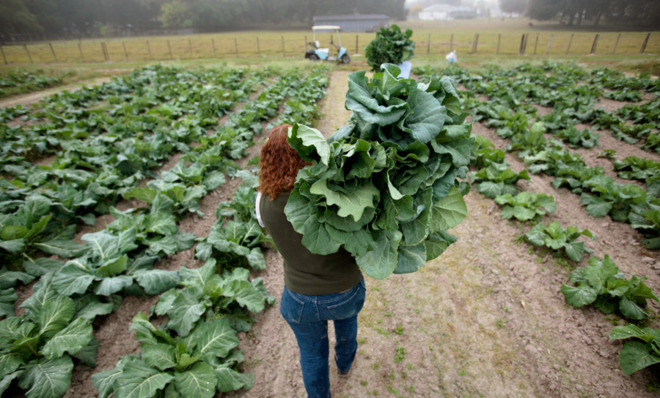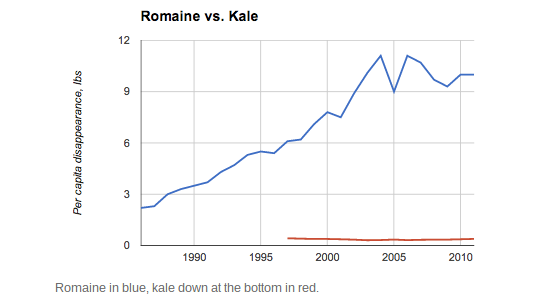Sorry, there's no such thing as 'food gentrification'
Agricultural commodities aren't like houses


A free daily email with the biggest news stories of the day – and the best features from TheWeek.com
You are now subscribed
Your newsletter sign-up was successful
Gentrification typically refers to the wealthy moving into once-poor neighborhoods, bidding up the price of housing, and pushing out the previous occupants, who can no longer afford the rent or property taxes. Rising housing costs are a real problem with horrible consequences — but do they have any relevance to food?
Some writers (like Mikki Kendall) think so. They have been repurposing the concept of gentrification, arguing that when wealthy people flood the market for traditionally lower-class items like kale and collard greens, they push the poor out of the market. At Bitch Media, Soleil Ho explains the reasoning like this:
...what if, as a consequence of trendiness, collard greens end up costing more across the board and the people who historically have been able to eat it simply can't afford to anymore? [Bitch Media]
I don't think this holds up.
The Week
Escape your echo chamber. Get the facts behind the news, plus analysis from multiple perspectives.

Sign up for The Week's Free Newsletters
From our morning news briefing to a weekly Good News Newsletter, get the best of The Week delivered directly to your inbox.
From our morning news briefing to a weekly Good News Newsletter, get the best of The Week delivered directly to your inbox.
Agricultural commodities are quite different from housing. Whereas most neighborhoods around the country sharply restrict the kind and quantity of housing one is allowed to construct, there are few such regulations on farmland. If one particular crop suddenly becomes profitable due to a surge of yuppies snatching up the latest "superfood," that's a profit opportunity for farmers, who can and will switch their fields over and make a profit, which will tend to knock the price down.
That is to say: For most single agricultural commodities, increased demand will typically translate into increased production rather than increased prices. This can be seen even in an Upworthy infographic that made the rounds on Facebook, scolding wealthy Whole Foods shoppers for starving the poor. In its telling, the number of stores selling kale increased by more than a factor of 10 in three years, yet the price only increased 25 percent! (And this is leaving other confounding factors like persistent drought in key farming regions.)
There is one notable exception: quinoa, which only grows in particular South American climates marked by high altitudes and unusual soil conditions. As such, supply is constricted and prices have increased a great deal. However, kale, collard greens, and teff (the new hotness in food trends) are all fairly tolerant species and can be grown just about anywhere.
That's not to say that overall food prices haven't risen; they certainly have. But I'd lay this at the floor of drought, crop failures, increased worldwide demand, and deregulation that allowed Wall Street speculators to pile into commodities futures markets (which was probably behind the gigantic food price spike of 2008). My point is that trends in single foods will not lead to uncontrolled price spikes because of the crop substitution effect.
A free daily email with the biggest news stories of the day – and the best features from TheWeek.com
Because in any case, despite all the heat and light, the reality here is that we're talking about a tiny fraction of the American agricultural market. To wit, here's an insightful chart from Lydia Depillis at The Washington Post showing a measure of kale consumption per capita compared to romaine:

Make no mistake, American food policy is completely bonkers. We subsidize and produce corn so much we're practically building houses out of it. We then feed that excess to cattle that aren't designed to eat it, which in turn makes them sick, forcing us to stuff them full of high-test antibiotics, thereby advancing daily the date at which everyone is going to die of drug-resistant super-TB. (And that's just for starters.)
Most critically, 16 percent of people don't have enough to eat. That is a monstrous fact in a nation as rich as ours — but rich people who shop at Whole Foods have little or nothing to do with it. Blame congressional Republicans (and Democrats to a lesser extent), who are doing their best to balance the budget by snatching food out of the mouths of widows and orphans.
Ryan Cooper is a national correspondent at TheWeek.com. His work has appeared in the Washington Monthly, The New Republic, and the Washington Post.
-
 Why are election experts taking Trump’s midterm threats seriously?
Why are election experts taking Trump’s midterm threats seriously?IN THE SPOTLIGHT As the president muses about polling place deployments and a centralized electoral system aimed at one-party control, lawmakers are taking this administration at its word
-
 ‘Restaurateurs have become millionaires’
‘Restaurateurs have become millionaires’Instant Opinion Opinion, comment and editorials of the day
-
 Earth is rapidly approaching a ‘hothouse’ trajectory of warming
Earth is rapidly approaching a ‘hothouse’ trajectory of warmingThe explainer It may become impossible to fix
-
 The billionaires’ wealth tax: a catastrophe for California?
The billionaires’ wealth tax: a catastrophe for California?Talking Point Peter Thiel and Larry Page preparing to change state residency
-
 Bari Weiss’ ‘60 Minutes’ scandal is about more than one report
Bari Weiss’ ‘60 Minutes’ scandal is about more than one reportIN THE SPOTLIGHT By blocking an approved segment on a controversial prison holding US deportees in El Salvador, the editor-in-chief of CBS News has become the main story
-
 Has Zohran Mamdani shown the Democrats how to win again?
Has Zohran Mamdani shown the Democrats how to win again?Today’s Big Question New York City mayoral election touted as victory for left-wing populists but moderate centrist wins elsewhere present more complex path for Democratic Party
-
 Millions turn out for anti-Trump ‘No Kings’ rallies
Millions turn out for anti-Trump ‘No Kings’ ralliesSpeed Read An estimated 7 million people participated, 2 million more than at the first ‘No Kings’ protest in June
-
 Ghislaine Maxwell: angling for a Trump pardon
Ghislaine Maxwell: angling for a Trump pardonTalking Point Convicted sex trafficker's testimony could shed new light on president's links to Jeffrey Epstein
-
 The last words and final moments of 40 presidents
The last words and final moments of 40 presidentsThe Explainer Some are eloquent quotes worthy of the holders of the highest office in the nation, and others... aren't
-
 The JFK files: the truth at last?
The JFK files: the truth at last?In The Spotlight More than 64,000 previously classified documents relating the 1963 assassination of John F. Kennedy have been released by the Trump administration
-
 'Seriously, not literally': how should the world take Donald Trump?
'Seriously, not literally': how should the world take Donald Trump?Today's big question White House rhetoric and reality look likely to become increasingly blurred
